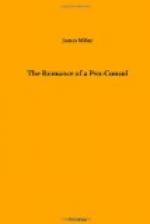‘At first,’ he related the exploit, ’I was doubtful whether I could fairly attribute the scheme to Rauparaha. However, I satisfied myself that the information which had reached me was well-founded. It had been brought by a man who was in touch with the Maoris creeping down the coast, and who could speak Maori. These bodies of natives, you understand, had prevented all news travelling. That was how they were able to get so near, without our being aware of it.
’What was I to do? Was I to delay until actually attacked? That would have been to wait for too much proof of the plot; and my information satisfied me. I had a picked force put on board a man-of-war lying at Wellington, and with it, and another small vessel, we set out for Rauparaha’s country. Besides myself, only three or four of the officers, I suppose, knew the nature of our mission. We landed, after dark, at a point of the sea coast near Rauparaha’s camp, quietly surrounded it, burst in and captured him. The thing was to swoop into the camp before the Maoris could have any warning, or attempt to resist. Thus an encounter, involving slain and wounded, would be avoided. Rauparaha was taken off to the ships in a boat, and we conveyed him to Wellington.
’The results were as I had anticipated, for Rauparaha being our prisoner, there was nobody to give the word of command to the Maori disaffectants, who melted away. I told Rauparaha there were two courses open to him. He could take his trial, before an open court, for what he had done, or he could remain a prisoner, until I thought the interests of peace would permit me to release him. He elected to continue my prisoner, and other chiefs became bail for him when I did let him go.
’Rauparaha’s defence was that he intended no harm, and that he was not in the plot, for he admitted there was a plot. I asked him why, if he meant no harm, he did not tell me that all these men had come so near. To that he had no answer, and besides I submitted to him a letter, which had been sent up the coast, telling the men to march down. He called the letter a forgery, but there was no question, in my judgment, that it was dictated by him and circulated by his desire. The best proof of its genuineness was that its plan was carried out, that the Maoris did collect in response to it. Nobody could have managed the business but Rauparaha.
’What would have been the outcome of an attack on Wellington? Turmoil! I certainly believe that it would have been attacked. Then, a large force must have been sent to punish the raiders, or Wellington would have had to be abandoned. In either event, the progress of New Zealand would have been thrown back for years.’
Though restored to his tribe, Rauparaha never regained his power, and was a desolate man. It was a characteristic of the Maoris, that when a chief had a tumble he lost his influence. To that detail Sir George added another, namely that Rauparaha was a very good speaker. Indeed, many of the Maoris had the true gift of eloquence. Rauparaha left some Maori manuscripts, about himself, to the Governor who had so unceremoniously made him captive. It was a tribute to that Governor’s genius for attaching the regard of men, converting even enemies into friends.




